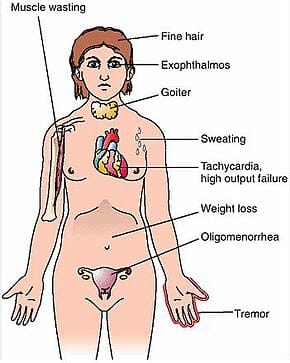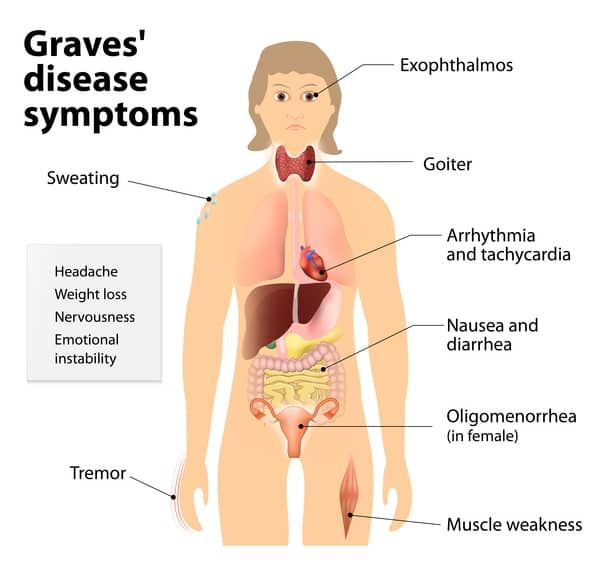Unveiling the Truth: How Long Can You Defy Graves’ Disease and Live Life to the Fullest?

Graves’ disease is an autoimmune disorder of the thyroid gland, where it produces too much of the said hormones. This condition, also known as hyperthyroidism, can manifest with symptoms such as anxiety, tremors, heat intolerance, weight loss, and an irregular heartbeat. The outcome for an individual with Graves’ disease varies depending on several factors, which include the severity of the disease, the age at diagnosis, and how well the condition is managed by treatment.
What is Graves’ Disease?
Graves’ disease is an autoimmune disorder of the thyroid gland, a small butterfly-shaped gland located in the neck that synthesizes hormones important for modulating various processes in the body, such as metabolism, heart rate, and body temperature.
It is said that Graves’ disease causes antibodies to develop against the thyroid gland, causing the overproduction of thyroid hormones. This condition is called hyperthyroidism, a fact that might lead to a variety of symptoms, such as anxiety, tremors, heat intolerance, weight loss, and an irregular heartbeat. Graves’ disease is the most common cause of hyperthyroidism, affecting roughly 1 in 200 people in the U.S. It is more common in women than in men, usually occurring in people aged between 30 and 50.
Symptoms of Graves’ Disease
The generation of more-than-normal amounts of the thyroid hormones characterizes Graves’ disease. Graves’ disease causes symptoms of hyperthyroidism. Symptoms of Graves’ disease come with a range of severity and may develop either suddenly or in the form of a gradual progression.
Here are some of the most common symptoms of Graves’ disease:
- Nervousness, anxiety, and irritability
- Difficulty sleeping (insomnia)
- Unexplained weight loss despite increased appetite
- Heart palpitations or a rapid heartbeat
- Heat intolerance and increased sweating
- Shaky hands (tremors)
- Frequent bowel movements or diarrhea
- Muscle weakness, especially in the upper arms and thighs
- Changes in menstrual periods in women
Why is treatment important?
Treatment is important for treating drug abuse and addiction because it addresses not only drug use but also any associated medical, psychological, social, vocational, or legal issues. Effective treatment that is adjusted to the individual requires long-term treatment and may need multiple episodes for the individual to maintain abstinence and fully restore functioning.
-
Managing Hyperthyroidism: The fundamental problem in Graves’ disease is the overproduction of thyroid hormone (hyperthyroidism). This hyperactive state has negative effects on almost every system in your body.
- Heart Health: Hyperthyroidism, if left untreated, can be associated with a fast or irregular heartbeat (arrhythmias), as well as the weakening of the heart muscle, increasing the likelihood of stroke and heart failure.
- Bone Fragility: Excess thyroid hormone interferes with your body’s ability to use calcium, leading to weakened bones (osteoporosis) and an increased risk of fractures.
- Pregnancy Complications: Uncontrolled Graves’ disease during pregnancy can affect both the mother and baby, including the risks of miscarriage, premature birth, and low birth weight.
- Mental Well-being: This always-revving state will make anxiety and irritability worse and severe problems with your sleep that will adversely affect your quality of life
-
Preventing Thyroid Storm: A quite rare but life-threatening complication, untreated by Graves’ disease, is a ‘thyroid storm.’ It’s characterized by a sudden and rapid spike in thyroid hormones and by symptoms such as fever, rapid heart rate, agitation, and even delirium. It calls for immediate medical intervention.
-
Addressing Graves’ Eye Disease: Although not all Graves’ disease sufferers develop eye symptoms, treatment can help manage and sometimes reverse the symptoms of Graves’ ophthalmopathy (bulging eyes, inflammation).
-
Achieving a Normal Life: Successful treatment helps regulate thyroid hormone levels. This means:
- Heart problems are less likely to develop.
- Bone density can be maintained.
- Symptoms like nervousness, tremors, and heat intolerance improve.
- The risk of complications during pregnancy decreases.
What Happens When You Have Graves’ Disease
When a person has Graves’ disease, their immune system produces antibodies that mistakenly attack the thyroid gland, causing it to produce excessive amounts of thyroid hormones. This condition is known as hyperthyroidism. Here’s what happens when a person has Graves’ disease:
- The thyroid gland produces too much thyroid hormone. The thyroid gland generates thyroid hormones, which govern several functions of the body, ranging from metabolism to heart rate and body temperature. In Graves’ disease, the thyroid gland produces hyperplasia, or the overproduction of thyroid hormones, resulting in hyperthyroidism.
- Hyperthyroidism causes symptoms: The hyperthyroidism symptoms, which develop when thyroid hormone levels are raised too much, show up to be a collection of diverse manifestations ranging from anxiety to tremors, heat intolerance, and weight loss, often developing with an irregular heartbeat. The symptoms might start to develop suddenly or gradually over time.
- The immune system attacks the thyroid gland: Graves’ disease is an autoimmune disorder, where the immune system targets the thyroid gland by mistake. Antibodies produced by the immune system attack the thyroid gland, causing it to produce too much of its hormones.
- Graves’ disease can lead to complications. If left untreated, Graves’ disease can lead to serious complications like heart problems, weakened muscles, and bone density loss. Treatment is essential to managing the condition and preventing complications.
- Treatment can help alleviate symptoms and prevent complications: Treatment for Graves disease can be effective in decreasing the symptoms and preventing complications. A variety of modes of treating this condition is available such as antithyroid drugs, radioactive iodine therapy, and thyroidectomy. Treatment would be based on the individual’s age, the nature of their symptoms, and also on an individual’s likings and dislikings.
conclusion
Graves’ disease might feel overwhelming at first, but the good news is it doesn’t have to control your life. With the right treatment and care, you can manage those racing heartbeats, the weight loss, and the worry. You can protect your heart, your bones, and your overall well-being. It means getting back to feeling like yourself and living a long, healthy life. Don’t hesitate to talk to your doctor; they’re your partner in getting Graves’ under control.




